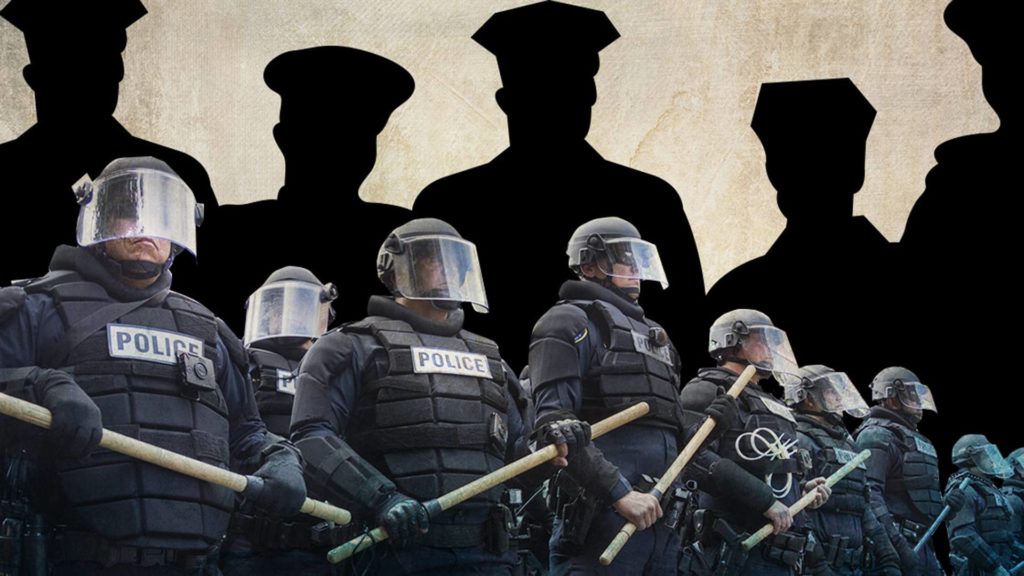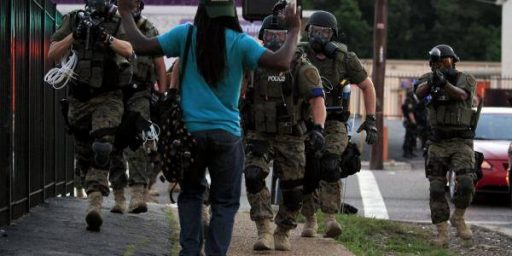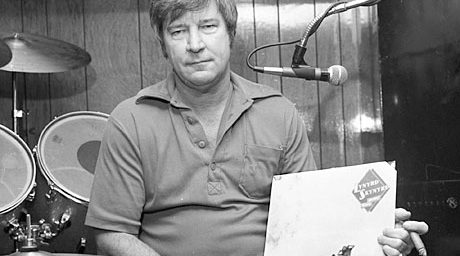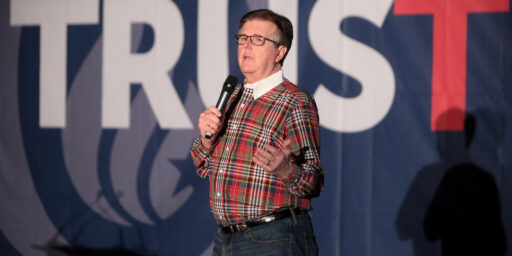Police Shouldn’t Be Anonymous
Cops aren't soldiers or spies but fellow citizens.

Former CIA counterterrorism officer and current Savannah police detective Patrick Skinner has some strong views on what’s happening in the streets of America’s cities.
My name is Patrick Skinner, and I’m a local police officer. I love that I can say that. For me, one of the best things about being a local police officer is the openness of the job. On patrol my name is on my uniform; as a detective my name is on my business cards. Either way, it’s always on my tongue: I introduce myself to literally every single neighbor I meet while on duty. By definition and design my work is in public as I work with the public. There is nothing anonymous or unidentifiable in my work. My authority comes from my neighbors, and my ability to do my job comes in part from my neighbors knowing who I am.
My name is Patrick Skinner, and I’m a former CIA operations officer. I love that I can say that now, but at one time I could not say that. Overseas my name sometimes wasn’t even my name; at home my name was my own, but my work was hidden. Either way, the cover story was always on my tongue. My work was clandestine and covert. Even my workplace, my employer, was secret. By definition and design, my work was not in public. There was nothing identifiable or attributable in my work. My authority came from presidential findings and national security laws, and my ability to do my job came in part from my neighbors not knowing who I was.
[…]
There are many and major issues surrounding police work in America, all of which need serious discussion and commitment and action to address. I write now about only one, and I write with some urgency. That is the notion that law enforcement — local, state or federal — not just can but should engage with the public in anonymous fashion during times of emergency or crisis. This is happening now in Portland, Ore., with federal law enforcement and often happens with local police across the country during protests. Everything I have done, experienced and learned from all my roles shows me not only that this is the wrong path to address our challenges, it is also the path that led us to this crisis in the first place.
[…]
The federal response to these local challenges is not just making matters worse, it’s making the protesters’ point. That point is that law enforcement has become far too militarized in their equipment and mind-set and sometimes unaccountable and even anonymous in their operations and consequences. A persistent concern by so many communities is their belief — with justification — that their local police departments are relatively unaccountable for their mistakes, misdeeds and even crimes while they themselves are hammered by those police for their own mistakes, misdeeds and crimes.
[…]
So it is no accident that the federal law enforcement officers sent to Portland were essentially anonymous to the locals and therefore unaccountable to the locals. Since 9/11, even the most anodyne of federal law enforcement agencies have bulked up their roles and their costumes in the theater of counterterrorism. The militarization of local police is finally getting the broad scrutiny it deserves, but the trend of equipping and training for asymmetric war against an ever-elastic list of “terrorists” is even worse under the sprawling umbrella of the Department of Homeland Security, whose agencies include the Federal Bureau of Prisons; Immigration and Customs Enforcement; and Customs and Borders Protection, all of which do important work, none of which should be countering protests and demonstrations on American streets.
These federal agencies apparently believe that the public identifying their officers, of knowing who they are, would present an unacceptable risk to those officers. The risk to the public and the very idea of accountability to the public evidently was dismissed. Protesters and city officials alike were not soothed by reassurances from federal officials that there were “unique identifiers” for the federal officers that only their agencies would know. Mark Morgan, acting commissioner of Customs and Border Protection, put out a statement defending his officers’ anonymity, saying on Twitter, “You will not see names on their uniforms b/c these same violent criminals use this information to target them & their families, putting both at risk. As Acting Commissioner, I will not let that happen!”
The exquisite paradox — of protesters demonstrating against being treated as enemy combatants by their local police departments, only to be met with federal forces doing the same thing but with better equipment and zero local accountability — is wrongheaded and unjust all around. Law enforcement knows the power of a name, the power of identity, the power of accountability. It insists on all three of those things from the public in almost every interaction. Yet during a time where identity and accountability are needed most — at the time of most tension — law enforcement says it will provide neither.
[…]
Unaccountability metastasizes under cover of anonymity, and it is a blight to policing in America. I say this as the police officer I am, living where I work in Savannah, Ga., and the covert CIA officer I was, working overseas. I understand the needs of both jobs and reject the notion that anonymity and secrecy — or the militarized environment in which they operate — play a role in public police work. There are of course reasons a specific police officer engaged in undercover work needs her or his identity shielded, but for police work done in public against the public, visibility and accountability are required. This applies to federal law enforcement as well, especially since in Portland it was those units that were in many ways the outside agitators. They were acting under vastly expanded interpretations of federal authority and responsibilities, over the pointed objections of local and state officials.
My name is Patrick Skinner, and I love that my neighbors can say that. My neighbors are the best thing about my job as a police officer. I am accountable to them precisely because they know who I am. I am not afraid of them. I am not afraid of them knowing who I am. I would be terrified if it were normal that they didn’t.
This is really well said.
Skinner has been a voice of professionalism and community-based policing on Twitter for a while now. He was the subject of an uplifting New Yorker profile back in April of 2018 and wrote another WaPo column last month titled “I’m a cop. I won’t fight a ‘war’ on crime the way I fought the war on terror.” Both are worth the read.
Skinner is the model of what we’d want cops to be, combining intelligence, humility, and compassion. High rightly eschews the notion that the people he meets on the beat, including those involved in disturbances to which he’s dispatched, are the enemy. Instead, he sees them as fellow members of the community.
As much as I’ve written about the evils of militarized policing (an attitude I got from my father, who spent years in policing in the military), I’ve done it as succinctly as this:
At this moment of maximal national tension and outrage, when national leaders are calling the streets of America a “battlespace,” with police officers as warriors who should “dominate” and give “no quarter,” I am telling whoever will listen: Police are not warriors — because we are not and must not be at war with our neighbors.
For decades, the United States has funded and created police departments that resemble occupying military forces, unable to protect and serve. We armed ourselves literally and spiritually for a war on crime, and to quote Abraham Lincoln’s Second Inaugural Address, “And the war came.” What we now see deployed in many cities and towns is anti-policing. It’s the death of true community police work and, too often, the death of our neighbors. The well-documented militarization of American police departments has inevitably produced officers who see themselves and their roles as “warriors” or “punishers” or “sheepdogs.” Much of what our society finds so distressing and unacceptable in police interactions with their neighbors — disrespect, anger, frustration and violence — is not a result of “flawed” training; it’s a result of training for war.
Sadly, it’s almost certainly going to get much worse before it, hopefully, gets better.






Usually headlines are deceiving or at least over simplifying, but I think you summed it up perfectly in that one.
Our local police chief not only goes out to meet the community, he writes a semi-regular column for my newspaper.
I interviewed him when he first got the job, and he said something that really impressed me. (paraphrasing): “My job is to ensure that people are safe and free to go about their business. Sometimes that means I have to enforce the law.”
Well said.
I’m anxious to find out who exactly is operating in Portland.
I’m willing to bet it’s paid mercenaries, and not military.
There should be a federal law to the effect that no law enforcement officer at any level, local, state or federal, can make an arrest nor detain anyone nor even question anyone, be they citizens, residents, tourists or illegal immigrants, without identifying the agency they represent, the applicable charge, or the reason for detention or questioning if no charges apply.
Where are these anonymous police officers, who aren’t undercover? The DHS team in Portland has “Police” in yellow front and back and on shoulder patches they have DHS and their unit. Plus high on the shoulder the have a unique identifier tab that more specifically identifies them than a last name. Sure, you have to inquire of the DHS, or via a federal court, to get the specific identity that goes with the identifier.
On the other hand, these federal officers conduct operations against individuals and organizations that won’t hesitate to track down and kill American police and federal agents. At their homes. Some of these types of people may be amongst the “peaceful protesters” trying to burn down the federal courthouse in Portland, but the certainly are along the border and elsewhere the DHS teams operate. Similar with the US Marshals team.
And the uniform argument would be different, if these agents and officers weren’t having to do hand to hand combat with rioters and arsonists, but rather just standing around monitoring peaceful protesters.
@Daryl and his brother Darryl: customs and border patrol, apparently, because within 50 miles of a border they’re allowed to do whatever they want more or less, is my lay understanding.
The Edith Green – Wendell Wyatt Federal Building is 18 stories of giant slabs of reinforced concrete and steel I-beams, I’m sure a couple Molotov cocktails will be enough to take it down. EYEROLL EMOJI
@Teve: oh, shit, a friend just posted this.
@JKB: You justify fascism. Not surprising, since you’re a fascist, but still, it’s disgusting behavior from anyone who calls himself a patriotic American.
@JKB:
Oh, spare me the paranoia. This is not Mexico, no one is tracking down and murdering DEA agents in the US, for the very good reason that they know it will bring hellfire down on them and their organization. That’s the kind of lazy bullshit fear-mongering people use to justify fascism.
It is not profitable to kill federal agents in the US which is why it pretty much never happens. And only an unhinged rightwing nut would imagine that 20-something protesters are going on a killing spree.
As always, @JKB, you are incapable of honesty.
@JKB:
Jesus H. Christ, you have gone completely around the bend.
They are beating up Moms…and they are damaging medical supplies, which is a war-crime.
The beat and injured a former military guy because he asked them a question.
They are kidnapping US citizens.
When you defend all of that, simply because you are on Team Trump…then you are truly a POS.
@JKB: “On the other hand, these federal officers conduct operations against individuals and organizations that won’t hesitate to track down and kill American police and federal agents. At their homes.”
Started sniffing glue, have you?
@Teve: A friend of mine is a Protective Security Officer at the STL federal building. I really doubt any of the PSOs are among the people anonymously patrolling Portland for the simple fact that 90% (or some such) of the PSOs are retired cop and military, supplementing their 20 year pensions in a job where having to get into physical confrontations is rare. They might reminisce about their old head banging, knee crunching days, but most of them aren’t looking to return to them.
Have I ever wondered how? No, I know how they do it, what I wonder is why they take so much pleasure in it. That’s what I don’t get.
When I see JKB, I just skip it entirely. I have better things to do than subject myself to that kind of derangement.
@OzarkHillbilly: on every discussion board there one or two posters that you learn to just skip past.
It puts me in the mind of the old man at the end of this clip
@OzarkHillbilly:
I think “JKB” may be middle-Kingdom demotic for “Devoid of Meaning.” I’m uncertain about the pronunciation, because the Egyptian script omitted al vowels, very much like modern Hebrew does.
I’m not sure. It may be just gibberish.
@JKB: your fever dreams about hunting down cops is interesting considering it was a right wing activist that recently hunted down a federal judge and killed her son. go back to your swamp.
@Michael Reynolds:
When I was a young lawyer, I talked to a U.S. attorney about his job and whether I would apply for similar work. I asked whether he ever felt threatened as the result of prosecuting [alleged] criminals, the really bad and well-connected kind. He said, no, he didn’t because even those criminals know that if they go after the prosecutor, there will be a dozen more where that one came from.
@JKB:
But they aren’t police. Certainly not in the common usage of the word, where police are local. And the identification of their department is as close to invisible as possible. Contrast to the DEA and the FBI, who clearly identify themselves when operating in public.
And in Washington DC the paramilitary thugs didn’t even have that, nor would they identify themselves or the agency they work for. We still don’t know who they were with certainty, only that they were kind of chunky.
More camouflaged than the rest of their uniform.
We should not have federal thugs doing local crowd control, kidnapping, teargassing, etc. over the objections of the local authorities.
And, law enforcement on US soil should be readily identifiable, otherwise they cannot be held accountable for their actions. Actions which, in this case, are assault.
Michael “Wear a Mask” Yudell
@PublicsHealth
My very old friend and colleague Maureen Healy–a fellow historian and Chair of History at Lewis and Clark College in Portland–was shot above her eye by Trump’s federal officers last night in #Portland. Please take a moment to read her statement. #BlackLivesMatter
#Vote
I’m not even sure they are law enforcement, due to the fact they don’t appear to be enforcing any laws.
“Police shouldn’t be anonymous”, is true enough if by ‘police’ one is meaning someone like your quoted Mr Skinner. If the point of having them on the streets with serious weaponry and unknown authority and random detentions/arrests in order to spread terror and influence political actors, then obviously ‘anonymous’ is exactly what they should be. Of course this is not some bureaucratic mistake. And it’s not going to be ‘corrected’ any time soon.
What country did you think you are describing here?
@Teve: They were channeling the now me 20 years ago. I keep telling people I’m just an old retread, and they don’t quite believe it.
I for one know that the truest version of principled “libertarianism”* is to completely reverse one’s views on federal and local policing powers, not to mention the heavy-handed exercise of state power/violence, so long as someone you agree with is in control of said power.
On a completely unrelated note, it’s always fun to revisit the archives (especially if you search in page): https://www.outsidethebeltway.com/militia-takes-over-federal-wildlife-refuge/
* – Note the scare quotes are out of respect for the many, intellectually consistent Libertarians who are doing amazing work to reform the criminal justice system regardless of which party is in power (because they, actually subscribe to Libertarian principles for all rather than just for themselves).
@OzarkHillbilly:
“Among the protesters this week was Maureen Healy, who joined a march Monday as demonstrators sang songs and chanted the names of Black lives lost.
Just after midnight, she saw a line of authorities wearing camouflage and dark outfits advance on the crowd. The crowd retreated, and Healy said she heard bangs, saw smoke and was struck by a projectile. She went to the hospital with a black eye, cut to her face and a possible concussion.
“I was protesting peacefully so why did federal troops shoot me in the head?” asked Healy, 52, who is the chair of the History Department at Lewis & Clark College.”
@Lynn: Thank you for taking a moment to read it. And quite a few more moments to transcribe it, something I was too lazy to do for the people too lazy to right click and open in a new tab. 😉
ETA: my bad, you didn’t transcribe her statement, you quoted a news source. Still I thank you for filling in a few of the blanks so that maybe a few more might right click and open in a new tab.
@mattbernius: Boy, that last line of the post really says it all, doesn’t it?
@JKB: Considering that those same “uniforms” and “identifying patches” can be bought on Ebay, they aren’t very good for identification purposes.
It would be really nice if there were more cops on American streets who were more like Patrick Skinner rather than Derek Chauvin…
Patrick Wyman’s latest, Imperial Wars Always Come Home, throws the light of historical perspective on this matter.
Just two notes:
1) When eh speaks of the Roman Frontier, he means the border regions at the Empire’s boundaries.
2) He neglects to mention the US-Mexico border was far different before the crackdown on immigration and subsequent militarization, not to mention the failed “war on drugs.”
@JKB: Every time someone lights so much as a small campfire, some douches want to throw the constitution on it.